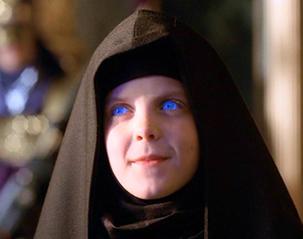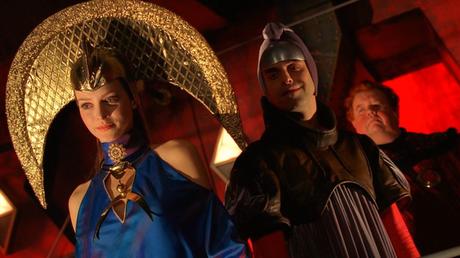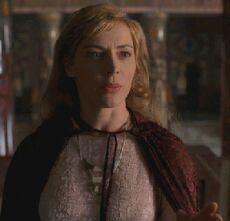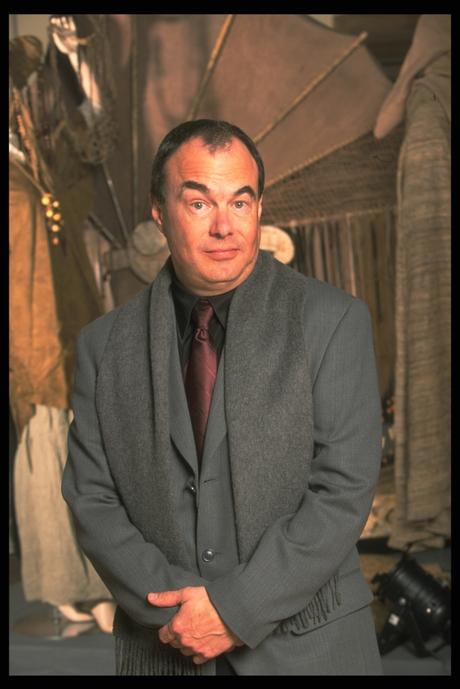
Alia, Paul's underage sister, sits and stares at a tiny little mouse (this rodent is the literal "Muad'Dib" from whom Paul derived his Fremen name). After a few seconds, Alia looks out into the vast distance. We cut to Chani and Reverend Mother Jessica. Chani tends to her baby boy. There is a difference of opinion, it seems, between her and Jessica over how to raise Paul's infant child - i.e., more time with the sietch or more time with mother-in-law Jessica. Hmm, to learn the Weirding Way perhaps?
Jessica speaks of her son Paul's many attributes; his "availability," as it were, to align himself with one of the other great houses. Chani knows what she means and deigns to do her part, when the time arrives.
We switch to House Corrino, where the duplicitous Minister Fenring shows Baron Harkonnen and smug nephew Feyd around, hinting that "talks" will soon be underway. During their walk, Feyd spots Princess Irulan on the balcony. Noticing the young Adonis, Irulan turns away. Feyd smiles but does not get the message (which is, "Keep the hell away from me, you brainless oaf").
In the next instant, the Baron floats behind the Spacing Guild envoy, who has obviously conveyed Muad'Dib's message to the emperor. With his royal highness is the minister and Reverend Mother Gaius Helen Mohiam, who stare down at Baron Harkonnen's floating form as he tries to "explain away" the reasons why the spice has not flowed.
Babbling on about "this Muad'Dib character," old B.H. (more like B.S.) insists that the agitator is obviously some sort of religious fanatic out to gum up the works. "Have you stared into the eyes of a religious fanatic?" the angry emperor queries him. "Suicide and martyrdom are often the same thing." Reverend Mother Mohiam and the Spacing Guild agent call for immediate action. To combat the rebels, the emperor plans to move his forces into position, which, he hopes, will lure this fanatic out of hiding. What do they say about the best laid plans of mice and men? We will find out soon enough.

The scene changes to Reverend Mother Jessica's arrival at Paul's sietch. She brings her grandson with her. Jessica worries that Paul will challenge Stilgar's leadership over his own sietch. She also confesses to him that she has purposely used the Fremen's legends to ensure their survival. Not surprised in the least by this rather late-in-the-game admission, Paul counters with his belief that he has answered destiny's call. So, in a way, events have been shaped far in advance. At the same time, everything is going as planned, whether they were foreseen or not - a curious and, to be clear, ultimately dangerous path they both have been treading.
Turning matters on their head, Jessica admits to Paul that her initial purpose in life was to produce a daughter who could be wed to the Harkonnen heir. At the same time, this marriage would end the centuries old feud between their two houses. In addition, this daughter was destined to become the long awaited Kwisatz Haderach. After centuries of selective inbreeding, planning and executing, the so-called "best laid plans" of the Bene Gesserit have failed. Who is Paul, then? Where did he come from? How did he get into the picture? Is he really Jessica's son? Is he a god? A messiah? A myth? The one who will lead them down that primrose path?
But the path can also be changed, can it not? Things need not be as they were once foretold. With that in mind, Jessica charges Paul with finding a way to keep Stilgar as their ally (the old "Keep your friends close, and your enemies closer" gambit), thus solidifying their hold on a trusted Fremen leader and, in a bold leap of faith, on the Fremen themselves.
After Paul has departed, Jessica suddenly finds herself in Gurney Halleck's iron grip. He plans to kill her on the spot. His reasoning is to exact revenge for her betrayal of the assassinated Duke Leto. By a sheer stroke of luck, Paul interrupts the attack on his mother at the moment Gurney is about to cut Jessica's throat. Remember, the Weirding Way is the way of speech, of turning one person against the other by the mere sound of one's voice through the power of suggestion. This is why Gurney charges her with keeping her trap shut.
Thinking fast (which he must do in order to avoid a catastrophe), Paul maintains that it was Doctor Yueh who was the traitor, not his mother. Jessica confirms this. With that, Gurney is aghast and disgusted at his behavior. Imagine: a split second more and innocent blood would have been spilled. And Gurney would have met his end at Paul's hand. Monstrous!
Besides, an even worse scenario has just taken shape: For all his powers of perception, Paul missed out on anticipating Gurney's sneak attack on his mother. Why didn't Paul see it coming? Perhaps his mind was clouded with other thoughts, namely those of revenge. The end result is that a broken Gurney Halleck falls to his knees in bitter remorse. In the director's commentary, Harrison made note that P.H. Moriarty (Gurney) had recently lost a close friend, which lent his performance a bittersweet ring of truth.
Alone with Chani, Paul ruminates on his having missed Gurney's attack. He asks that Chani take their only son to the Southern Sietch, far away from the danger they are facing, i.e., assassination attempts. Facing his worst fears, Paul goes out by himself to ride the giant sandworm. He travels swiftly to the Great Temple. While there, he communes with the planet Arrakis' past, present and future.

The winds hint that Paul has taken the Waters of Life, reserved strictly for the Bene Gesserit. Visions - dark, stormy visions at that - cloud his mind (hopefully, not his judgment). Pressing his temples with both hands and massaging his head, Paul finally sees the future that is about to unfold.
Otheym, one his followers, comes upon him. At the last, Otheym shouts out Paul's sacred name: "Muad'Dib!" Paul topples over in a faint.
In a change of scene, Chani, now dressed as a high priestess, reappears. All the Fremen are gathered in prayer and chant. Both Jessica and Chani enter Paul's bedchamber. They find him in a trance with eyes open. He has been this way for a week. Has his time come at last? Will he snap out of this coma, a coma that he himself has induced? And for what purpose? Even Reverend Mother Jessica is at a loss as to how to revive him. To cover her tracks, Jessica has let it be known that Paul is in a "sacred swoon." Chani kisses Paul on the lips and immediately realizes that he has taken the Waters of Life.
After a long while, Paul finally revives. He thanks Chani for squeezing more water down his parched throat. For all her Weirding Way powers, Jessica had presumed that he was dead - another unexpected failure. Clasping both her hands into his, Paul shares his fateful vision with his mother. He sees the here and the now - "the future and the past" - all at once, all the same. Indeed, Paul is the long-awaited Kwisatz Haderach, the one who is many places at once. "I am the whirlwind," he whispers calmly.
This last phrase may remind attentive viewers of General Allenby's curt remark about the "gone native" Lawrence of Arabia: "He's riding the whirlwind." There are many similarities, no doubt, as both Sir David Lean's film epic and Frank Herbert's literary tome emerged, more or less, side by side or, at best, roughly simultaneously with one another, though apparently unrelated.
Jessica appears frightened by this situation. She voices her concerns about going where Paul has gone. She calls him by the sacred name, but Paul insists he is more than that. "I am the fulcrum, the giver and the taker." He is the master of fate, the tool of fate. In a telling reversal, Jessica is now the one surrounded by lifeless bodies. The cries of the innocent, the dead and the dying, the children of Arrakis, appear to engulf and torment her. Placing her hands over her eyes, Jessica is unable to look death in the eye.
At that moment, Chani calls to her, saying the Reverend Mother has come out of her revelry. "I am fine," Jessica states, while looking askance at her prostrate son. "Now you understand," Paul intones. He lies back on his cot.

Lady Jessica is now a Reverend Mother, a mother to her son, and a mother-in-law to his consort, the Fremen freedom fighter Chani. As well she is competitive with her daughter-in-law by default. Jessica has been placed in the position of supporting young Paul as the sole heir to House Atreides. Her hope, then, is that he will be reinstated with the title of Duke, to take his father's rightful place.
For Chani, she too has a position of her own to maintain, her being the late Dr. Liet Kynes' daughter. And, therefore, a person of high rank in the Fremen pecking order. Both parts, that of Jessica and Chani, have been perfectly cast as was mentioned earlier.
There is an art nouveau ambience attributed to Planet Kaitan (and, coincidentally enough, to Prague, Czech Republic as well, where the series was filmed), a wonderfully ornamented style for the Padishah Emperor Shaddam IV's gaudy palace.
Lady Jessica sees what Arrakis, and the spice, have done to her son. Hence, he is no longer a pouty teenaged boy but a full-grown adult who accepts the role that has been given to him, that is, the mantle of leadership. Director Harrison dismisses the clash of acting styles. For instance, Saskia Reeves, the more classically trained actor who prepares her lines in advance, knows where her character is going what and she will do. Advance preparation is her way of divulging character.
In comparison, Alec Newman is the more intuitive of the two. He's the one who goes with his gut. He lives in the moment and depends more on spontaneity - very much in the Method mode of acting but modern in approach. Their clash of styles lent spark to their scenes, and made for excellent contrast in true mother-and-son fashion. It will remind viewers of the Gertrude and Hamlet dynamic from Shakespeare, both with competing interests and varying viewpoints.
"Herbert was writing about the relationship of the individual in a mass culture," Harrison notes, "which is where our world is evolving. Individual cultures do not want to be absorbed... It's about those who rage against the modern age, where one's identity was closely linked to a tribe or an intellectual idea. We are creating a mass global culture. It's unstoppable at this point."

Certainly, social media (with respect to Facebook, Twitter, TikTok, Instagram, and their like) have been at the forefront of this cultural change which, in the time that Dune was staged, filmed and released (the year 2000), has perfectly captured the angst of that era and ours.
The trajectory, then, is from the following story sequence: First, there is exposition, followed by an inciting incident. Next, a rising action that reaches a midpoint. After the midpoint, we have a falling action, followed in turn by a crisis that will lead to a resolution.
In other words, the classic five-act-play approach that William Shakespeare made popular in his day. Or today's two or three act structure, if your mind cannot grasp the five-act pattern. The rising action should but does not always segue into the falling action. It's something to keep in mind when considering a work of such enormously epic and complex proportions as Herbert's Dune world.
"The saga of Dune is far from over..."
(To be continued...)
Copyright © 2023 by Josmar F. Lopes
